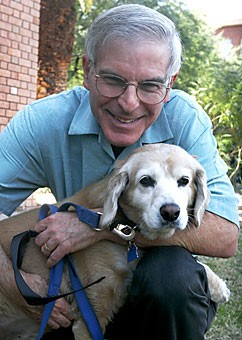Imagine a life full of perhaps everything you have wanted to accomplish – graduating college, getting married to the love of your life, having plenty of money, having a rewarding and fun job, and possibly retiring at a decent age.
Now imagine all of that mixed with vaudeville comedy, ancient archaeological discoveries, folk bands, being trilingual and having a movie character based on your life, and you will have an idea of what it’s like to be David Soren, a classics professor at the UA.
He manages to be a modern-day Renaissance man, dabbling in reality shows, working to bring an art collection to the UA, buying and selling time-weathered sheet music, and writing books and articles published around the world.
The Wildcat spoke to Soren to discuss his life and career.
Wildcat: So, how did your professional career begin?
Soren: I started when I was 9 years old as professional dancer on the CBS television show “”Children’s Hour”” in Philadelphia. After that, I toured with the Philadelphia Eagles as an opening act.
W: What about your vaudeville career?
S: At about the same age I entered the world of vaudeville as an entertainer. I did vaudeville for a long time in my life and sometimes I still do some of the shtick in my classes. Last year, I was voted into the encyclopedia of vaudeville (Frank Cullen’s “”Vaudeville, Old and New””), which only includes 1,500 performers. Today, I am one of 20 performers alive.
W: Do you do anything with vaudeville now?
S: The American Vaudeville Institution closed two years ago, so I wrote a grant to get the collection to come to the UA. If it is accepted, then more than $100,000 worth of priceless memorabilia will be housed here in Tucson.
W: What kinds of things did you do after being a child performer?
S: After I met my wife, we performed together in a folk band and even made a record with ABC-Paramount that did fairly well. After that, we both played in rock bands – she was the lead singer of my psychedelic rock band called Sphinx. I was lead guitarist and lead vocalist and I wrote a lot of the music, too. We both kind of went with the flow of the times.
W: How did you meet your wife, Noelle?
S: We met on an archaeological dig in England. She walked into the room I was in, and I said to a friend that that’s the woman for me. Three days later, we wrote good-bye letters to our fiancées – we both happened to be engaged to other people at the time – and got engaged. We do research together, write books together and have been together for 40 years and still going.
W: What’s this about you being in the movie “”Animal House””?
S: At Dartmouth, I was in the fraternity Zeta Psi. One of my fraternity brothers, Chris Miller, was one of the writers for the movie. The character (based on Soren) is the guy who goes over to the house and plays the guitar all the time and (John Belushi’s character) destroyed the guitar. I got that reputation as the hippie guy with the guitar. In real life, the brothers jumped me, took my guitar, kidnapped me and left me in the freezing cold five miles out of town. I walked back to town and almost died because I had frostbite.
W: You almost died?
S: Yeah, at that time hazing was still OK. After that, I de-pledged from the frat. But the frat really was known as the ‘animal house’ at Dartmouth.
W: Do you do anything else in the entertainment world?
S: Currently, I am working on developing an intellectual reality show with KUAT called “”Where Did it Come From?”” Students will do video projects on people who had famous lives but have been forgotten. I am a creative consultant for the Learning, History and National Geographic channels, so I adapt scripts so that they are accurate. And I write books on show business.
W: You are an archaeologist. What kinds of things have you unearthed?
S: My special field is ancient mega-disasters, so I discovered the largest infant cemetery that, in turn, led us to find the oldest evidence of malaria in Italy. I also found a sacred spring possibly used by Augustus. While in Cyprus, I found evidence of the largest earthquake in the Mediterranean, that was published in National Geographic.
W: I noticed that your dog is always around you. Does she go everywhere with you?
S: My dog, Angel, hangs out with me all day. She is a prescribed dog. I used to get overcommitted with too many projects, so dealing with a dog helps to slow me down. She goes with me to classes, she’s in my office with me, she goes everywhere with me.
W: What do you do in your spare time, if you have any?
S: I run the Humanities Seminars program, which offers humanities classes for adults in the serious pursuit of intellectual stimulation and enrichment in the Tucson community. I help bring some of the UA’s most distinguished scholars to teach the classes. I also design and build museums. I have built museums in Cyprus, Portugal and Tuscany and soon in Umbria, Italy.
W: Where can students find you next semester if they want to take one of your classes?
S: Next semester, I will teach Classics 329 and Classics 300, but usually they fill up fast.









